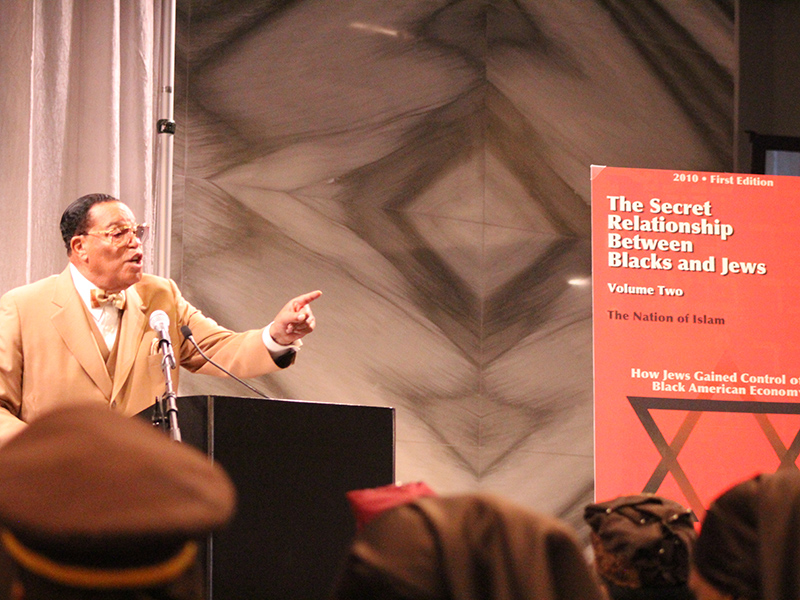WASHINGTON (RNS) — Before a crowded ballroom at the Watergate Hotel, Nation of Islam leader Louis Farrakhan called on President Trump to repent for what Farrakhan called America’s mistreatment of black people over the centuries.
“America is a great nation but America needs to reflect on her sins,” Farrakhan told a gaggle of reporters and hundreds of supporters who showed up Thursday (Nov. 16) for an event billed as “a major message” to the Trump administration.
For more than two hours, Farrakhan drifted from politics to religion – citing Christian and Muslim scriptures – and back. He combined condemnation of presidents past and present — though he was more supportive of former President Obama — with declarations of his continuing devotion to Elijah Muhammad, his predecessor as leader of the Nation of Islam.
“I am here from my teacher, not out of hate but out of hope that maybe what I say to this 45th president of the United States of America might have an effect to get him off the course that he is on,” Farrakhan said.
He suggested Trump forgo plans to confront North Korea.
“You will never get North Korea to give up what she has as a trump card – that’s over, Mr. Trump,” he said. “Can you live with North Korea with nuclear weapons? I think you’re going to have to, even though you have war plans already to knock out North Korea.”
The 84-year-old leader, his speech accented by images of former U.S. presidents and a poster of a Nation of Islam book about blacks and Jews, dove into all sorts of controversies – from slavery to the unhealthy water in Flint, Mich., to current reports of sexual harassment by national leaders and celebrities.
The Nation of Islam’s influence has waned since its heyday in the 1950s and ’60s, when the movement claimed to have half a million adherents. African-Americans were drawn to its message of self-sufficiency and piety that combined a mistrust of the white establishment and a call for black separatism. Its numbers are now thought to be much smaller.

Nation of Islam Minister Louis Farrakhan speaks at the Watergate Hotel in Washington, D.C., on Nov. 16, 2017. RNS photo by Adelle M. Banks
Farrakhan addressed the long-standing charge against him of anti-Semitism, which arose during his support for Jesse Jackson’s 1980s presidential campaign. He said he admires Jews and their contribution to civilization.
“There are righteous Jews, good Jews, Jews that want to practice the teachings of the prophets,” he said. “But then there are others who don’t wish to practice and it is they that hated Reverend Jackson’s desire to be president.”
He repeated his conspiracy theory that 9/11 was a setup.
“The country was so divided that what it needed was some event that could pull a divided country together,” he said of the time after the contested election between George W. Bush and Al Gore. “So here comes 9/11 and they said Muslims did it.”
And as for recent sexual harassment scandals, Farrakhan maintained all members of Congress might be guilty. And he quoted Allah’s words that are rendered in at least one English translation of the Quran as: “Did I not find you groping and show you the way?”
Farrakhan said it wasn’t “nice” for Trump to call protesting football players names for kneeling at games and said blacks were under attack in other ways.
“You’re under assault, black brothers and sisters,” he said. “Why is the sperm count in black men falling? Because of the food you eat and the water you drink. The lead in the water in Flint is not an accident.”
Farrakhan said he planned to contact Trump via mail and added, drawing laughter from the crowd, “I don’t go to White Houses.”
His speech came two years after he spoke in Washington at the “Justice or Else” rally in 2015 to mark the 20th anniversary of the Million Man March that brought hundreds of thousands of black men to the National Mall. The anniversary event brought together supporters of the Black Lives Matter movement along with Latino, Native American and Palestinian activists who urged better treatment – from opposing deportation to reducing mass incarceration.





